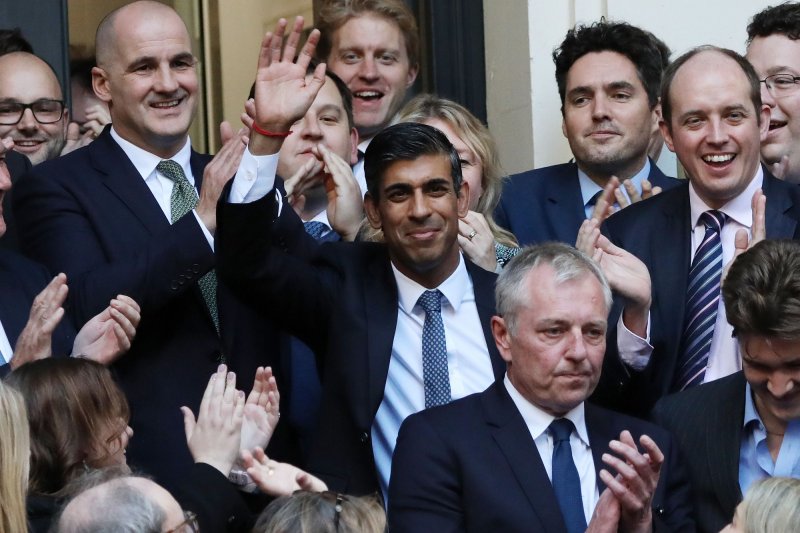1 of 3 | For weeks, British Prime Minister Rishi Sunak and his Conservative government have been struggling with growing discord over economic cutbacks that have triggered widespread protests across the country in recent weeks. File photo by Hugo Philpott/UPI |
License Photo
Jan. 20 (UPI) -- One of the largest unions in Britain has announced a plan for thousands more emergency workers to strike for 10 days over the coming weeks, ramping up pressure on the government as a continuous wave of angry public sector employees threaten to cripple the nation's most critical industries.
Tens of thousands of emergency medical technicians -- upset over low pay, dwindling staff, and the rising cost of living -- were already set to stay home Monday in many corners of the country, including Wales and the West Midlands, North West, North East and East Midlands of England.
And now at least 2,600 more ambulance workers will add to the staggering total in the latest boycott planned by Unite General workers union, which has accused the Conservative government of dragging its feet in the ongoing negotiations.
"Rather than act to protect the NHS and negotiate an end to the dispute, the government has disgracefully chosen to demonize ambulance workers," said Unite General Secretary Sharon Graham, referring to National Health Service employees. "Ministers are deliberately misleading the public about the life and limb cover and who is to blame for excessive deaths."
The Conservative government has been struggling with growing discord over deep economic cutbacks that were meant to shore up the nation's economy amid the worldwide inflation crisis.
For weeks, both sides have gone back and forth with no end in sight as the government was not backing down from its position of being fiscally responsible during hard times.
On Friday, union leaders vowed to continue the fight but also ensured the public that regional emergency services would remain intact throughout the work stoppage to respond to life-threatening emergencies.
"Our members faithfully provide life and limb cover on strike days and it's not the unions who are not providing minimum service levels: it's this government's disastrous handling of the NHS that has brought it to breaking point," Graham said.
The newest protests will be staggered over two months, and occur across the United Kingdom from the end of January through at least mid-to-late March, according to a Friday announcement from the union.
The first of the newly announced strikes will occur in Northern Ireland on Jan. 26. The next walkout on Feb. 6 will cover a wider swath of the country, with strikes planned in the Northwest region, which will coincide with protests in the Northeast and Northwest regions, Wales, and the East and West Midlands on the same day.
Each of those regions can also expect to see public services scaled back or completely unavailable on Feb. 16, 17, 20, 22, 23, and 24; and again on March 6 and 20.
The strikes will pick up in Northern Ireland on Feb. 16 and 17, and once more on Feb. 23 and 24.
Four additional unions representing ambulance workers are currently voting on whether to join the effort to pressure British leaders who were being confronted on multiple economic fronts.
For weeks, British Prime Minister Rishi Sunak has been scrambling to negotiate a settlement as unions in several industries have turned to walkouts in an attempt to force the government's hand, but so far the talks have been highly contentious, and no meaningful agreements have emerged.
Earlier this month, Graham said workers were digging their heels in for a long fight unless Sunak came to the table with a viable offer.
"Unless and until he accepts the need to make real progress on the current pay claim, there will still be strikes across the NHS this winter," she vowed 11 days ago.
More recently, the British government had been planning to introduce new anti-strike legislation in Parliament that would enforce the upkeep of key public services, expose unions to lawsuits, and allow employers to summarily fire workers who choose to walk off the job.
Meanwhile, doctors and nurses in the Royal College of Nursing and ambulance workers union have also voted on strikes that were set to begin in February and extend into March, adding more pressure on Sunak's administration.
After the most recent sit-down, Sunak would not commit to a possible deal that might include one-off payments to nurses, while union leaders said they felt Sunak was being unreasonable in his demands for increased productivity in exchange for higher pay.
Throughout the negotiations, the prime minister has emphasized that any pay deal needed be affordable for the nation.
"We want to have a reasonable, two-way conversation about pay and everything else that is relevant," Sunak said recently. "People need to get talking, that's what they're doing, hopefully we can find a way through this."
The national rail industry -- including more than a dozen train operators -- recently cut service across Britain following several weeks of disagreements with the government over low pay and poor working conditions.
That pay dispute was similar to one that emerged in mid-December, when RMT -- the country's biggest rail union -- rejected a pay offer from the government while Sunak insisted the government had been fair.















